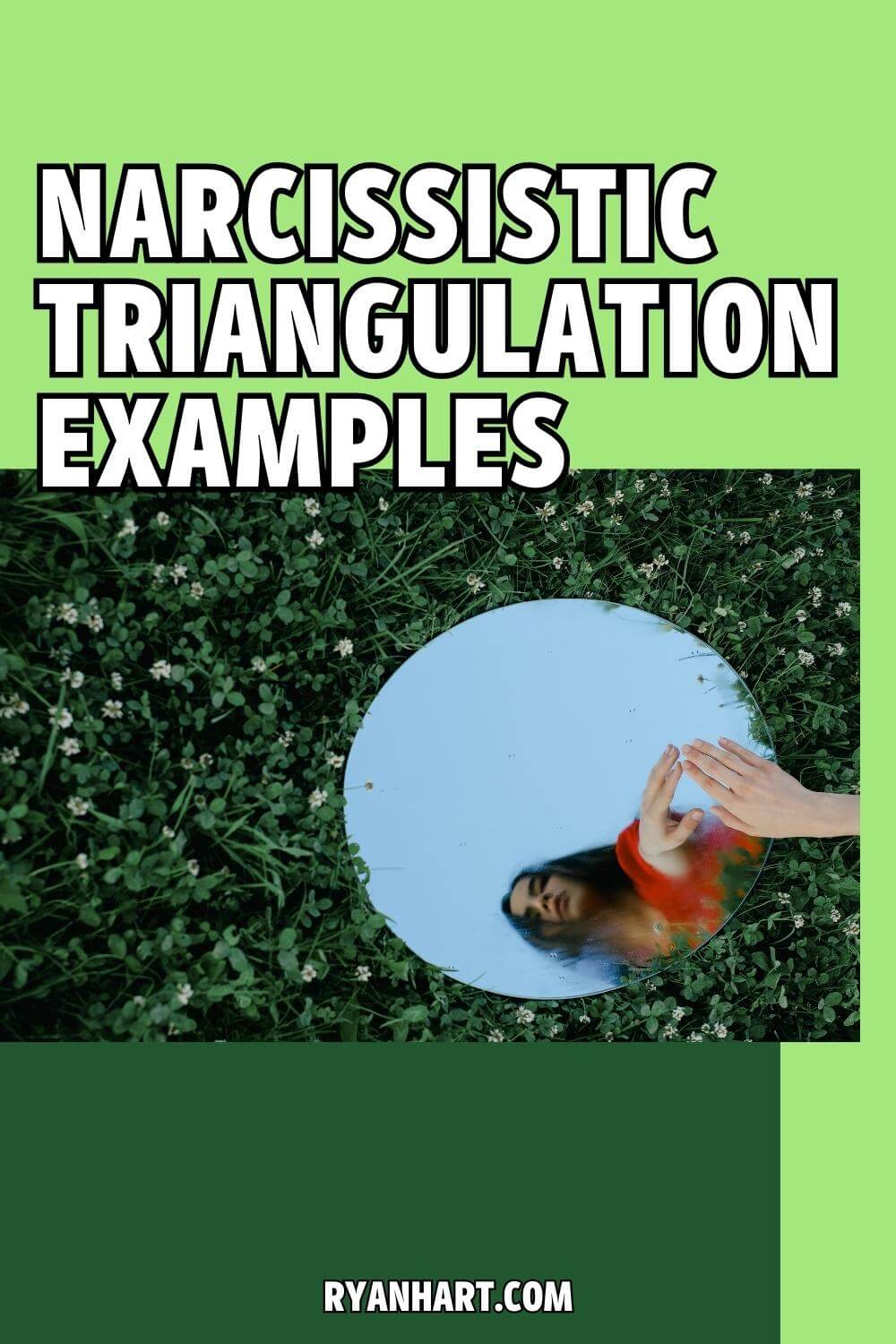Narcissistic Triangulation Examples in Relationships
by Ryan Hart | Updated on May 13, 2024 | Post may contain affiliate links. As an Amazon Associate we earn from qualifying purchases.
Are you struggling to understand why your partner, friend, or family member always seems to pit you against someone else?
Do you feel like you’re constantly competing for attention or affection, even when you don’t want to be? If so, you may be experiencing narcissistic triangulation.
Narcissistic triangulation is a manipulation tactic narcissists use to maintain control of their relationships.
It involves bringing a third person into the dynamic by comparing you to them, talking about them constantly, or even flirting with them in front of you. This creates a sense of competition and jealousy, which the narcissist can then use to their advantage.
In this article, we’ll explore some common examples of narcissistic triangulation and how to recognize and respond to this toxic behavior.

What is Narcissistic Triangulation?
If you have ever been in a situation where you find yourself in the middle of an argument between two people, you might have experienced triangulation. Triangulation is a common behavior that can occur in any relationship, but it can be particularly harmful when a narcissist uses it.
Triangulation is a tactic used by a narcissist to manipulate and control others. It involves bringing a third person into a conflict between two people. The third person is usually someone close to the narcissist or the narcissist perceives as being on their side.
Triangulation can be intentional or unintentional. In some cases, the narcissist may not even realize that they are using triangulation as a way to manipulate and control others. However, when intentional, it can be a powerful tool for narcissists to get what they want.
This strategy is often used as a way to create drama and chaos. By bringing a third person into a conflict, the narcissist can create a situation where they are the victim and the other two people are the aggressors. This can give the narcissist a sense of power and control over the situation.
By understanding the tactics of narcissistic triangulation, you can better protect yourself from the manipulations of a narcissist.
Narcissist’s Motives Behind Triangulation
When dealing with a narcissist, it’s important to understand the motives behind triangulation. Triangulation is a manipulative tactic used by narcissists to maintain control and power in relationships. Here are some of the motives behind triangulation:
Superiority
Narcissists have an inflated sense of self-importance and believe they are superior to others. They use triangulation to reinforce this belief by creating a hierarchy in their relationships. By pitting two people against each other, the narcissist can feel superior to both of them.
Power
Narcissists crave power and control in their relationships. Triangulation allows them to exert this power by manipulating the emotions and actions of those involved. They can use a third party to do their bidding and create a sense of fear in their victims.
Self-Esteem
Narcissists have fragile self-esteem and need constant validation and admiration. Triangulation allows them to receive this validation from multiple sources. They can create competition between two people, both vying for their attention and affection.
Control
Narcissists need to be in control at all times. Triangulation allows them to control the narrative and manipulate the situation to their advantage. They can twist the truth and use a third party to spread lies and rumors, creating chaos and confusion.
Insecurity
Despite their outward confidence, narcissists are deeply insecure. Triangulation allows them to alleviate their insecurities by creating drama and chaos. They can distract themselves from their own flaws and insecurities by focusing on the problems of others.
Narcissistic Supply
Narcissists need a constant supply of attention and admiration to feed their ego. Triangulation allows them to receive this supply from multiple sources. They can create drama and chaos, causing others to focus on them and their needs.
Examples of Narcissistic Triangulation
Narcissistic triangulation can be challenging to identify, especially if you’re not familiar with the term. Here are some examples of how narcissists may use triangulation tactics in relationships:
- Your partner constantly compares you to their exes, making you feel like you’re not good enough.
- Your partner talks to their friends about your relationship problems instead of talking to you directly.
- Your partner flirts with other people in front of you to make you jealous.
- Your partner tells you that their family doesn’t like you, causing you to feel isolated and alone.
- Your partner tells you they’re unsure if they want to be with you but then gets angry when you try to move on.
These are just a few examples of narcissists using triangulation tactics to manipulate and control their partners. It’s important to remember that these behaviors are not usual or healthy in a relationship.
Triangulation in Family Dynamics
Triangulation is a common manipulation tactic used by narcissistic parents in family dynamics. Parents often use this tactic to avoid taking responsibility for their actions and to maintain control over their children.
In family systems theory, triangulation is seen as stabilizing the family structure. The narcissistic parent may use triangulation to create a hierarchy in the family, with themselves at the top and their children at the bottom. They may also use it to divide siblings and create competition between them.
The golden child and the scapegoat are two roles that are often created through triangulation. The golden child is the favored child who the narcissistic parent often uses to triangulate with the scapegoat. The scapegoat is the child who is blamed for everything that goes wrong in the family and is often excluded from family events.
As a child of a narcissistic parent, you may have experienced triangulation in various ways. Your parent may have compared you to other family members, used other family members to manipulate you, or made you choose between them and someone else. They may have also used triangulation to create conflict between you and your siblings.
Recognizing when you are being triangulated and setting boundaries with your narcissistic parent is important. You can do this by refusing to engage in their manipulative tactics and seeking support from others outside the family.
Triangulation in Romantic Relationships
Triangulation is a common tactic used by narcissists in romantic relationships. It involves introducing a third party into a two-person relationship, often to create jealousy or to exclude the victim partner.
This can be done in various ways, such as by talking excessively about an ex-partner, flirting with someone else, or even bringing another person into the relationship without consent.
If you are in a romantic relationship with a narcissist, you may have experienced triangulation. They may have talked about their ex-partners in a way that made you feel jealous or insecure.
They may have flirted with someone else in front of you or even cheated on you with another person. These actions are all intended to make you feel inferior and to maintain control over the relationship.
Narcissists use triangulation as a way to create drama and chaos in the relationship. If you are paying attention to them, they will do anything to keep you on your toes. They may use triangulation to keep you guessing about their relationship commitment or make you feel like you are not good enough for them.
If you are in a relationship with a narcissist, it is important to recognize the signs of triangulation. This can help you to understand what is happening and to take steps to protect yourself. Some signs of triangulation in a romantic relationship include:
- Talking excessively about an ex-partner
- Flirting with someone else in front of you
- Bringing another person into the relationship without your consent
- Using jealousy to control you
- Excluding you from social events or activities
Set boundaries and communicate your needs to your partner if you are experiencing triangulation in your relationship. You may also need to seek support from a therapist or counselor to help you navigate the challenges of being in a relationship with a narcissist.
Triangulation in Workplace
Narcissistic triangulation can also occur in the workplace, where a boss or a coworker may use it as a way to divide and conquer. This tactic often creates a power dynamic where the narcissist can maintain control over their targets.
In the workplace, triangulation may involve a boss who complains about you to a coworker or a coworker who tries to turn others against you. As a result, rumors, gossip, and a lack of trust among colleagues can create a toxic work environment.
If you find yourself in a situation where you are being triangulated, it is important to remain calm and professional. Here are a few tips on how to respond:
- Address the issue directly with the person who is triangulating. Let them know that you know what they are doing and that it is unacceptable behavior.
- Document any instances of triangulation, including dates, times, and what was said. This can be useful if you need to escalate the issue to HR or a higher-up.
- Seek support from other colleagues who may be experiencing similar issues. This can help you feel less isolated and can also help you build a case against the triangulator.
- Consider seeking outside help, such as a therapist or a coach, who can help you develop coping strategies and navigate the situation.
Make sure you work in a respectful and safe environment. Don’t let a narcissist’s triangulation tactics undermine your confidence and your ability to do your job.
Impact on Mental Health
Being involved in a narcissistic triangulation dynamic can significantly impact your mental health. There is a risk of emotional distress, anxiety, depression, and loss of trust as a result. The effects can be long-lasting and can take a toll on your overall well-being.
For those with borderline personality disorder or other cluster B personality disorders, triangulation can be particularly damaging. It can trigger feelings of abandonment, rejection, and worthlessness, which can exacerbate existing mental health conditions.
The manipulation tactics used by narcissists in triangulation can also cause confusion and self-doubt. You may start to question your own perceptions and reality, which can lead to feelings of anxiety and depression.
It’s essential to recognize the signs of narcissistic triangulation and seek help if you’re experiencing any adverse effects on your mental health. Counseling and therapy can be helpful in processing and healing from emotional abuse.
Manipulation Tactics
Narcissistic triangulation is just one of the many manipulation tactics that a narcissist might use to maintain control over a situation. Here are some other manipulation tactics that a narcissist might use:
- Gaslighting: This manipulation tactic makes you doubt your perceptions and memory. The narcissist might deny something happened or tell you you’re overreacting.
- Splitting and Projection: The narcissist might try to split you against someone else by presenting them as either all good or all bad. They might also project their own negative traits onto others.
- Changing the Subject: When you bring up something the narcissist doesn’t want to discuss, they might try to change the subject to something else entirely.
- Divide and Conquer: The narcissist might try to create divisions between people to maintain control. They might tell different people different stories to create confusion and conflict.
- Dominance: The narcissist might use their power and influence to dominate a situation. They might use their charisma, charm, or intelligence to get what they want.
It’s important to recognize these manipulation tactics so that you can protect yourself from them.
Recognizing and Responding to Narcissistic Triangulation
If you suspect that a narcissist is triangulating you, it is crucial to recognize the signs and take action to protect yourself. Here are some ways to recognize and respond to narcissistic triangulation:
- Recognize the pattern: Narcissistic triangulation involves the use of a third party to manipulate and control the relationship. Look out for signs that the narcissist is trying to create a triangle, such as when they try to involve a third person in a disagreement or argument.
- Stay grounded in healthy communication: Narcissistic triangulation can be a way for the narcissist to avoid dealing with conflict directly. Stay grounded in healthy communication by expressing your thoughts and feelings openly and authentically.
- Don’t take the bait: Narcissists may use triangulation as a defense mechanism to avoid taking responsibility for their actions. Don’t take the bait and get pulled into the triangle. Instead, stay focused on your own needs and boundaries.
- Seek reassurance from a mental health professional: Narcissistic triangulation can be emotionally draining and damaging. Make sure you seek the support and reassurance of a mental health professional who can help you cope with the situation.
Conclusion

In conclusion, Narcissistic Triangulation is a manipulative tactic that narcissists use to control and dominate their relationships. It involves bringing a third party into the relationship to create a power imbalance or to make you feel jealous. It’s important to recognize the signs of Narcissistic Triangulation and to take action to protect yourself.
Don’t let a narcissistic partner use triangulation to control and manipulate you. By recognizing the signs and taking action, you can break free from this toxic cycle and move towards a happier and more fulfilling life.
This newsletter is not just good - it delivers the best relationship advice to your inbox every morning Join thousands of subscribers discovering how to stop chasing emotionally unavailable people and start attracting true love.
Don't miss the chance to add your name to the list before the next edition goes live. If you want to take advantage of this opportunity, simply click the below to access our secure sign-up page.
Try the Newsletter
Ryan Hart is a certified relationship coach and writer. His mission is to help make connections between people better, stronger, more meaningful, and longer lasting using technology.
Want to connect with Ryan? Click here to get his FREE daily dating advice newsletter
